


As businesses were forced to close their doors during the lockdown, more than half have cut working hours for their employees or implemented lay offs.
- A new study has revealed three million South Africans lost their job during the lockdown, with women accounting for two million of those.
- Martin Kingston of Business for South Africa said had the country implemented reforms to correct inequalities, less people would be made vulnerable by the pandemic.
- This is a global trend, with the UN saying women would be most impacted by the pandemic and 81% of the global workforce impacted.
Three million – that is how many people in South Africa have lost their jobs during the nationwide lockdown so far, according to a new study conducted by 30 social science researchers from five South African universities.
The research was released on Wednesday.
The National Income Dynamics Coronavirus Rapid Mobile survey studied 7 000 households to assess the impact of the lockdown on employment as well as welfare.
It is currently South Africa’s largest household survey yet, detailing the disastrous impact of the lockdown.
The study had four main findings
• Millions have lost their job or their income streams between February and April 20202, with women feeling the brunt of the impact. Out of the three million people who had lost their jobs in this period, two million are women.
• Pre-existing inequalities in South Africa have been exacerbated, with job and income losses concentrated among already disadvantaged people including black people, women, low wage earners and manual labourers.
• This loss of income has had a profound impact on food poverty, with half of those surveyed reporting that they had run out of money to buy food in April.
• Children have also impacted by this, with 15% of people saying their child had gone hungry in the last seven days during the survey. 7% said their child went hungry almost every day, or every day.
Covid-19 exacerbating pre-existing inequalities
Covid-19 exacerbating pre-existing inequalities
Speaking to News24, Business for South Africa’s Martin Kingston said he believed if South Africa had addressed inequalities, less people would have been impacted during the pandemic.
Kingston said:
If we as a country had taken the right decisions and implemented them 10 or 15 years ago, if we would not have allowed crime and corruption to flourish, if we would have ensured a capable and competent state, if we would have transformed our companies appropriately and in a sustainable manner, then I don’t believe we would be having this discussion.
“We’d still be dealing with the ramifications of Covid-19 but we’d have a stable, inclusive [and I want to emphasise that word] economy, with a much higher level of employment and therefore much fewer people who are vulnerable in the current circumstance as is indeed the case,” he added.
Kingston National Treasury estimated, under the worst-case scenario, about seven million jobs would be lost if action was not taken and “long-outstanding” reforms were not implemented.
READ | Covid-19 cuts SA employment figures by three million, women worst affected – study
He added job losses – while experienced in all sectors of society – were “first and foremost” impacting those who might not find employment in the medium or even short term.
“We are very concerned that it is women [previously and] currently disadvantaged South Africans who were discriminated against and continue to be discriminated against both pre-1994 and by the environment post-Covid-19.”
The effects, he said, was mass unemployment and poverty “at a time when as a country we can least afford it”.
ALSO READ | SA household survey: ‘Far too many people, children, are going hungry’
Millions of people have lost their jobs
A shocking 18% decline in just three months, between February and April, saw about three million people lose their jobs – from 17 million employed in February, to just 14 million in April.
The study shows one in three people, who were income earners in February, did not earn one in April.
These job losses were mainly among those already socially and economically disadvantaged – this was a theme identified across the studies done in the survey.
The study will follow up with the 7 000 participants until December to understand the permanency and impact of these findings.
Impact on women
Daniela Casale, an associate professor of economics at Wits University and team leader for the labour group, said women were already in a precarious position before the virus struck South Africa.
However, they have suffered the most during the pandemic in terms of job losses and one factor contributing to this is the disproportionate roles played by men and women in childcare, she added.
Covid-19 and the lockdown have only increased the gender gap, Casale said.
In February, women accounted for just under half of all employment but from then until April, they accounted for two thirds of the job losses, the study found.
“Because women are more likely to look after children in South Africa, increased vulnerability among women will translate into increased vulnerability among children,” she added.
ALSO READ | Access to healthcare more difficult during lockdown, SA’s largest household study finds
A global trend
In April, the UN warned the pandemic would have a disproportionate economic impact on women, the Guardian reported.
According to a UN policy brief on the impact of Covid-19 on women, evidence had suggested women’s economic and productive lives would be disproportionately affected compared to men – a situation made worse in developing economies.
“Across the globe, women earn less, save less, hold less secure jobs, are more likely to be employed in the informal sector. They have less access to social protections and are the majority of single-parent households. Their capacity to absorb economic shocks is therefore less than that of men.”
It also states, according to the International Labour Organisation, the lockdown had affected about 2.7 billion workers, or 81% of the world’s workforce.

